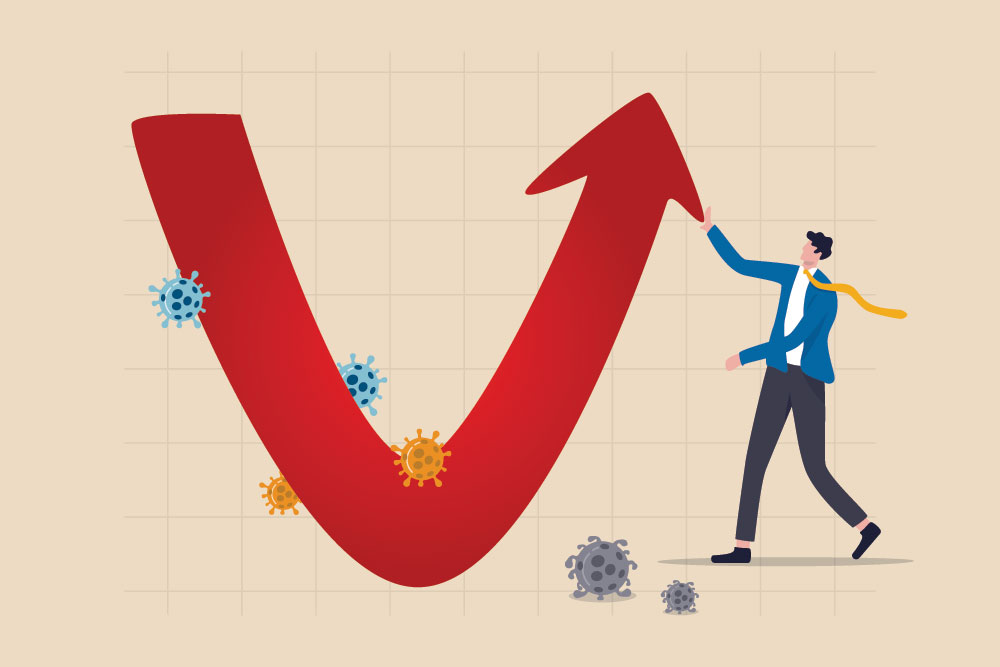
As the year reaches its half-way mark, with the UK’s EU transition-period end only six months away, there is no shortage of stories about geopolitical events, trade deals or which sectors are faring best and worst.
Now information may be key for our international trading readers, but so too is that another precious commodity: time.
With both in mind and to keep you up to date with the latest twists and turns in global trade, the content team at the IOE&IT has picked five media stories about which we think you should know.
1. V-shape recovery for UK
As Boris Johnson launched his ‘New Deal’ for Britain yesterday, the chief economist at the Bank of England gave the strongest prediction yet of a ‘V-shaped’ recovery.
A ‘V-shape’ recovery occurs when a sharp rebound in economic growth follows a sharp decline.
The economist, Andy Haldane, said consumer spending had improved “sooner and materially faster” than predicted in May.
This is in part due to high spending on DIY and household goods, and also a uptick in car and home sales, which had fallen sharply during the lockdown, the Guardian reports.
“It is early days, but my reading of the evidence is so far, so V,” he said.
He did, however, warn that inflation and unemployment could undermine the recovery.
2. Huawei U-turn hint
The UK’s culture minister, Oliver Dowden, gave the strongest hint yet that the government is about to U-turn on its decision to allow Chinese tech giant Huawei to develop the country’s 5G infrastructure.
The UK agreed a deal with Huawei in January but has been under significant pressure from the US – with which it is trying to agree a trade agreement – to pull out of the deal. A review has been ongoing in response to US sanctions against the firm.
“Given that those sanctions are targeted at 5G and [are] extensive, it is likely to have an impact on the viability of Huawei as a provider for the 5G network,” Dowden told the select defence committee on Tuesday.
3. New North American pact
A new trade pact was signed in North America on Monday to replace the previous NAFTA agreement which President Trump had described as “the worst deal in history”.
USMCA (US-Mexico-Canada) was signed by Presidents Trump, López Obrador and Trudeau but the fanfare was muted compared to that which accompanied the signing of NAFTA in 1994, the FT report.
NAFTA was heralded as the deal that opened Mexico up to the world, according to Verónica Ortiz, head of Comexi, a foreign affairs think-tank.
Carlos Salazar, head of Mexico’s main business lobby said of USMCA, “I don’t believe that on July 2, there is going to be a queue of foreign investors in Mexico”.
Trump threatened to pull out of NAFTA in his presidential bid in 2016, vowing to repatriate jobs from Mexico where there are lower wages.
4. EU to fight protectionism
The German Chancellor, Angela Merkel, has said the EU must fight protectionism and set a ‘good example’, as economies recover from the coronavirus pandemic.
Politico reports her saying that the multilateral response to the financial crisis – which was shaped in meetings of G20 leaders – has not been in evidence so far this year.
"These days, we have to do all we can to stop ourselves collapsing into protectionism,” she said. “If Europe wants to be heard, then it needs to set a good example."
5. Potatoes prosper
The global potato market thrived in 2019, increasing by 6% and rising for the third consecutive year.
Market analysis from IndexBox, reported in Global Trade Magazine, said demand is increasing and the market is expected to continue increasing over the next decade, bring the market volume to 441m tonnes by the end of 2030.
China, India and Ukraine consumed the highest volumes of potatoes in 2019, with a combined 45% share of global consumption.

